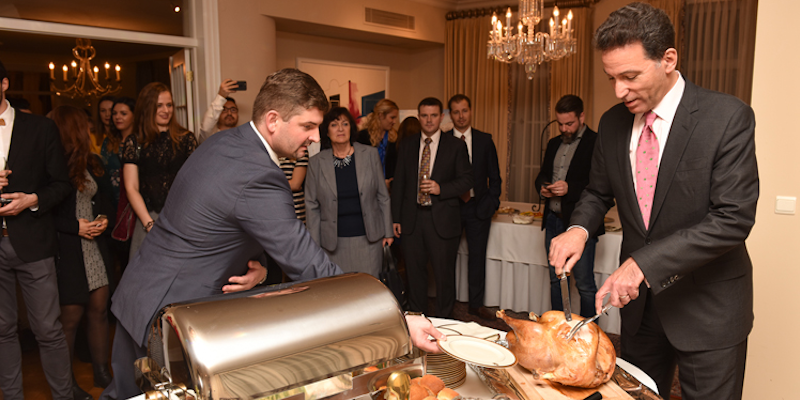
Abroad for the Holidays, Diplomats Create Another Kind of Family
We invite guests to our homes for Thanksgiving to showcase American history, traditions and culture. That creates great memories.
By ROBERT DOWNES | NOVEMBER 21, 2021

Have you heard of the Texas Embassy in London? Back in the first half of the 19th century, when my home-state was an independent republic, it had an embassy to the Court of St. James. Not far from that building, there was a Tex-Mex restaurant of the same name in the late 20th century. In 1997, my wife and I invited a British diplomat and his wife to the restaurant for one of our smaller Thanksgiving dinners during my 35 years in the U.S. Foreign Service. It was more common for us to host larger feasts for friends and contacts — both Americans and host-country nationals — at our house.
Diplomats invite guests to their homes for holidays like Thanksgiving to showcase American history, traditions and culture. In my case, there was an additional reason. Growing up, Thanksgiving was a big and important family affair, with about 30 relatives at my grandparents’ house in Arlington, Texas. I always enjoyed the 200-mile drive from our home. There were tables everywhere, several turkeys and lots of stuffing, gravy, mashed potatoes, ham, corn and other traditional favorites. Those extended family gatherings, however, ended for me when I joined the Foreign Service and spent the holidays thousands of miles away from home. So I had to create a different kind of family abroad.
Of the many Thanksgiving Days spent in other countries, three stand out with particular clarity. The first was at the beginning of my career, in the early 1980s, when I was a vice consul at the now-closed U.S. Consulate in Mazatlán, in the western Mexican state of Sinaloa, the base of the Sinaloa drug cartel. In addition to U.S. entry visas, we provided consular services to American citizens, which included visiting those imprisoned by the local authorities.
The prisoners in our district would quickly learn our home phone numbers — there were no cell phones back then — and would often call us, having bribed their jailors. Although seemingly an annoyance, we actually encouraged this practice, as the prisoners kept us informed of fellow Americans falling ill or being mistreated — or new U.S. prisoners who had arrived without the Mexican authorities notifying the consulate.
One Thanksgiving Day, as we were sitting down to a small dinner with friends, the phone rang. It was one of the prisoners calling from the Mazatlán jail. We had a long and positive relationship with him. I asked if he was all right and he said yes. He didn’t need anything. He just wanted to wish us a Happy Thanksgiving. Then he hung up. I think he was lonely, thought of us somewhat as family, and just wanted to share the holiday spirit.
In the 1990s, I served in the finance attaché’s office in Berlin, and my two children attended the public John F. Kennedy School, which taught in German and English. Since the Berlin Wall had come down in 1989, the number of American pupils had dropped sharply. My son’s kindergarten teacher asked my wife if we could host a Thanksgiving dinner for her class to help her students experience American culture. Other kinds’ mothers helped my wife prepare the turkey, dressing, corn and pumpkin pie. The guests loved the food, and we hope the dinner left a lasting memory.
When I was deputy chief of mission in Nicaragua about a decade ago, the embassy had a close relationship with the roughly 200 Peace Corps volunteers serving in the country. The Foreign Service considers the Peace Corps an extension of American diplomacy. When we traveled around the country, we would drop in on local volunteers and leave small care packages of peanut butter and other things to bring them a bit of Americana. We also sponsored raffles and other fundraising activities to support their development projects.
One year, the resident Peace Corps country director asked if embassy staff members would host volunteers overnight for the upcoming Thanksgiving holiday, since very few of them would return home. I offered to host up to10, if some didn’t mind sleeping on the floor. A few days later, the director asked if I could host as many as 15? I suggested she send me 20 people for Thanksgiving lunch, although I might not be able to house that many overnight. By the end of the week, the number was 25. My wife and I ended up hosting more than 30 volunteers for a traditional Thanksgiving dinner. Many stayed with us for several days, and we made sure they called home from our phone. My wife prepared a bag of homemade oatmeal chocolate chip cookies for each of them.
The energy of 30 positive-minded young people living in rural areas abroad, who came together with their family of Peace Corps volunteers, brought me back to the Thanksgiving gatherings of my youth. Best Thanksgiving ever.
Robert Downes is a retired senior Foreign Service officer whose foreign tours included Nicaragua, Venezuela, Mexico, Thailand, Germany and Australia.
The views and characterizations in this article belong to the author and don’t necessarily represent those of the U.S. government.
